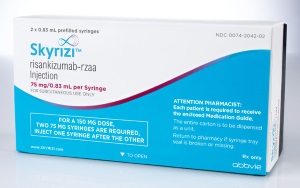AbbVie’s Skyrizi (ingredient: risankizumab), an interleukin-23 (IL-23) inhibitor, has passed the local health authorities’ reimbursement review three months after winning the marketing license in Korea.
A recent meta-analysis of 60 randomized, controlled trials of plaque psoriasis treatments, including oral agents and biologics, showed that Skyrizi had the strongest short-term and long-term efficacy. The study is expected to have a significant impact on the domestic psoriasis market, observers said.

JAMA Dermatology, a medical journal published by the American Medical Association, recently released a study, “Comparison of Biologics and Oral Treatments for Plaque Psoriasis.”
The study noted that although there are various treatments with clinical data for the treatment of moderate to severe psoriasis, there were no head-to-head randomized trials. The objective of the study was to estimate the relative, short-term and long-term efficacy of biologics and oral agents for the treatment of moderate to severe psoriasis, it said.
The researchers selected and analyzed phase 2, 3, or 4 randomized clinical trials of treatments licensed in the U.S. and Europe with data on Psoriasis Area and Severity Index (PASI) assessment of 75 percent, 90 percent, and 100 percent reductions at 10 to 16 weeks (short-term efficacy) or 44 to 60 weeks (long-term efficacy) from baseline.
According to the results of the meta-analysis on data of the 60 trials of oral agents, tumor necrosis factor (TNF) inhibitors and IL inhibitors, risankizumab, ixekizumab (brand name: Taltz), brodalumab (Siliq), guselkumab (Tremfya) had the highest PASI response rates in the short-term (10-16 weeks) and long-term (44-60 weeks).
Skyrizi, in particular, showed the highest PASI 75, 90, and 100 response rates in both the short-term and the long-term.
At weeks 10 to 16, Skyrizi’s PASI 75, 90, 100 response rates marked 89.2 percent, 71.6 percent, and 40.4 percent. At weeks 44 to 60, each figure was 90.1 percent, 79.4 percent, and 56.2 percent.
Among the IL inhibitors available in the local market, Cosentyx (secukinumab) and Stelara (ustekinumab) showed the lowest PASI response rates.
PASI 75, 90, 100 response rates of Cosentyx, an IL-17 inhibitor, were 83.1 percent, 61.4 percent, and 29.9 percent in the short-term. The numbers in the long-term were 88.6 percent, 71.3 percent, and 42.4 percent. Cosentyx had a significant gap with Skyrizi in PASI 100.
Stelara, an IL-12/23 inhibitor that was developed the earliest, had 69.7 percent, 43.9 percent, and 16.7 percent short-term response rates at PASI 75, 90, and 100. Stelara’s long-term response rates were 72.5 percent, 52.4 percent, and 31 percent, which were markedly lower than those of Skyrizi.
Armed with excellent data, Skyrizi recently passed the review of the Health and Insurance Review and Assessment Service (HIRA)’s Pharmaceutical Reimbursement Evaluation Committee. The recognition came three months after the drug obtained approval from the Ministry of Food and Drug Safety on Dec. 3.
AbbVie was able to win the drug’s eligibility of the health insurance benefit because the company chose a drug price at 100 percent of the weighted average of alternative medicines and skipped drug price negotiations with HIRA. This strategy shortened the reimbursement review period.
As Skyrizi is the latecomer in the local psoriasis treatment market, AbbVie has prioritized the drug’s market entry in Korea. If the company smoothly carries out the upcoming negotiation process, Skyrizi is expected to land in the domestic market without any problem, observers said.

